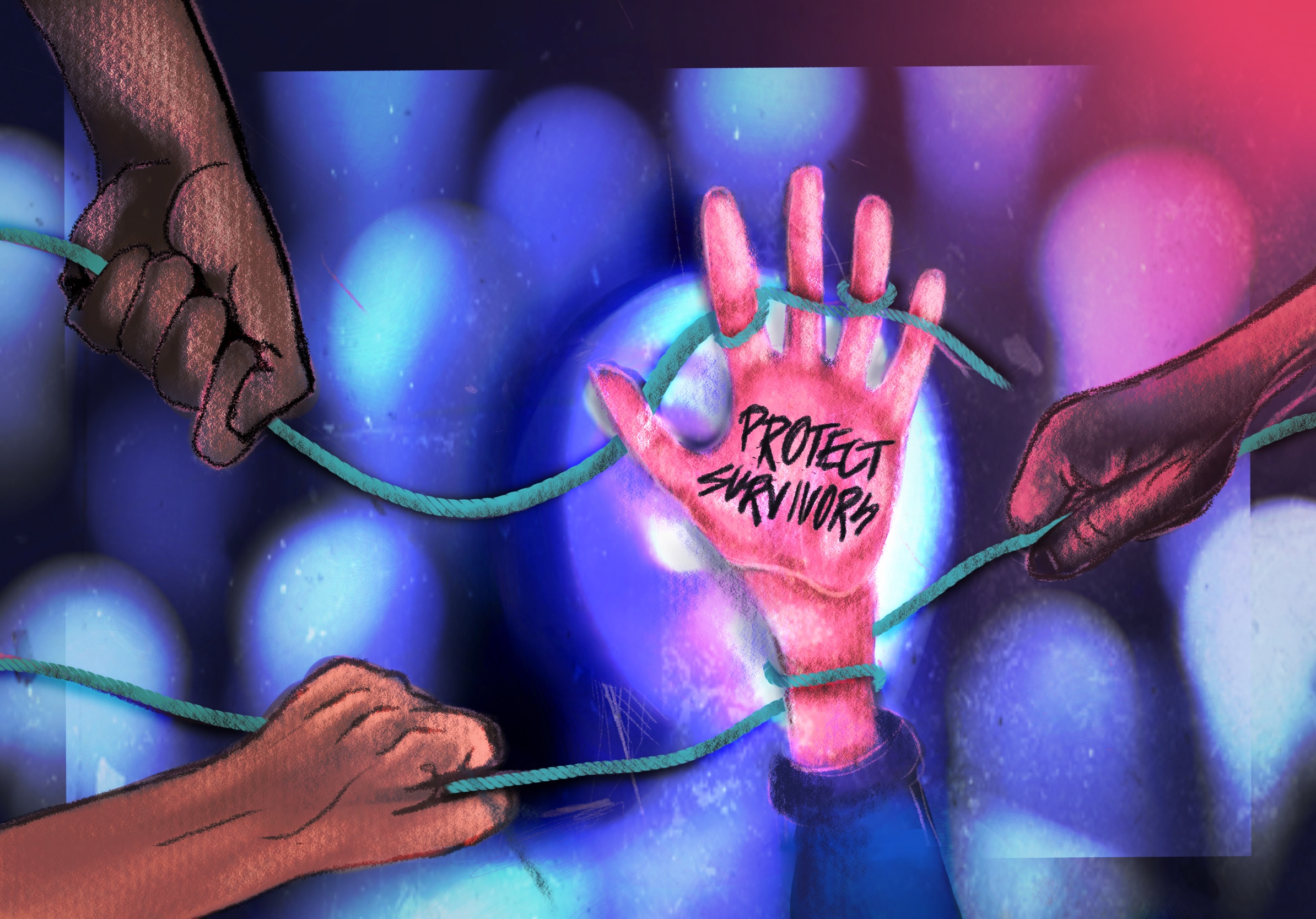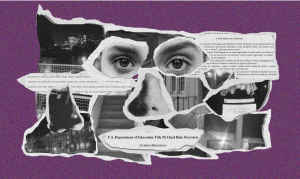Content warning: This article includes in-depth discussions of sexual violence.
I first arrived at Georgetown’s campus in August 2019, a bright-eyed, eager, and determined freshman ready to take on any challenge coming my way. Like many of us, starting college felt like the beginning of a new life; but to me, it meant the chance to live a life free from the consequences of experiencing sexual violence.
The summer before my junior year of high school, I had been raped by a classmate. At 16, I was thrust into navigating survivorship in India. My country has often been referred to as the rape capital of the world, with almost 87 reported rapes occurring every single day. There, an oppressive culture of underreporting means that sex and rape are taboo topics despite the immense sexual and domestic violence that occurs. This culture translates to complete institutional and social failure in responding to sexual violence or supporting victims, from friends, to teachers, to therapists and healthcare professionals. Although many forms of justice are denied when such failure occurs, one of the lasting detriments is the impact on one’s physical and mental health. Managing PTSD while also taking the bus to school every day just inches away from my rapist took a massive toll on my health, compounded by mountains of victim-blaming and slut-shaming. I focused only on what I needed to do to escape my environment and reach my dream college, Georgetown University, where I thought I could start over, safe and free.
I didn’t think it would be easy. I knew my PTSD and depression wouldn’t just disappear because my environment had changed. So, I planned to be in therapy regularly to manage my symptoms, and reached out to CAPS. But the white, male counselor that I poured out my story to had nothing to say to me, and CAPS soon informed me that the next appointment they had available would be three months later. I remember feeling shocked, lost, and defeated. I resolved to do the best I could do on my own.
A month later, I attended the first year mandatory Bystander Training. Nothing could’ve prepared me for the fact that, without a trigger warning and without an option to leave the room, we were shown a video of survivors graphically detailing their individual rape stories. My PTSD symptoms were triggered and I froze in my seat, tears running down my face uncontrollably, but I was unable to wipe them, to speak, to move, or even leave. My own experience played over in my head, intermingled with every other story I was hearing. I looked around and felt so desperately alone. Did no one think that someone in this room may be a survivor? Did no one center survivors when speaking about survivorship? I felt like I was in a different dimension than everyone else in the Arrupe Multipurpose Room that morning.
My first experiences attempting to get help as a survivor and being present in discussions of rape, survivorship, and PTSD had gone so poorly on campus; it’s hard to encapsulate the sheer desolation I felt. There was no support group to rely on, no therapy I could access, and a blatant disregard for rape, sexual assault and survivorship. Dreams of safety and freedom in my new home at Georgetown quickly faded away.
We often hear the statistic that “nearly 1 in 5 women in the United States has been raped in her lifetime (18.3%),” and that there are racial intersections in these statistics, with Black and Indigenous women being the most at risk of sexual violence. South Asian Americans are often underrepresented in rape statistics, a problem that relates to our small population percentage in the U.S. and underreporting within the community. However, not only do we exist, but as a community whose nations of origin suffer with incredible amounts of sexual violence and violence against women across intersections of caste, class, and colorism, survivorship is an issue that should be at the forefront of our minds.
My experience as a non-white, brown-skinned, bisexual gender non-conforming survivor has placed me at a nexus of vulnerability, but an aspect that many people fail to consider is re-traumatization. More than three-quarters of female victims of rape were first raped before their 25th birthday, and 42.2% had been raped before the age of 18. Being raped as a minor is a world different from being raped as an adult, with 35.2% of women who were raped before the age of 18 then also experiencing rape as an adult, compared to 14.2% of the women who did not experience rape prior to the age of 18. In 2019, I didn’t even know that my experience being a rape survivor as a minor would increase my vulnerability of being raped again.
Knowing now that so many of my identities are linked to higher statistical probabilities of sexual violence makes looking back on my history of sexual violence experiences an extremely daunting task. It feels like doomsday. It feels like walking around with “RAPE ME” written on your forehead. It looks like blaming yourself, every aspect of your identity and your body, from your (bi)sexuality to your skin tone, for the fact that you were raped or assaulted. There were times when I wanted nothing more than to throw my body away, wishing that I could just be somewhere else and be someone else, so that I could finally be free of sexual violence.
Unfortunately, none of this knowledge would have helped me protect myself any better on a campus that was already failing me. Over the course of my freshman fall, I was sexually assaulted multiple times, and raped once. Three of these incidents occurred with members of the South Asian community on campus, with one of the assaults occurring at the Rangila after party: a party that upperclassmen had told me was sometimes referred to as “a make out fest.” The immense misogyny and slut-shaming that I saw occurring in the South Asian spaces I had been a part of that freshman fall were incredibly reminiscent of home, and having experienced the devastating consequences of speaking out against my rapist once before, I chose to stay silent and to find peace. However, I have continued to experience sexual violence during my undergraduate years.
During my sophomore year on Zoom in 2020-2021, with the support of seniors like my friend Maydha who was trying to hold the community accountable for non-inclusive practices regarding aspects such as caste, I campaigned for sexual assault awareness, the implementation of survivor safety strategies, and proactive actions to combat misogyny within the South Asian community at the SAS townhall. Board members reached out to me to continue the conversation, only to never hold up their end of the bargain. When SAS 2020 Board Members decided to create a GroupMe chat adding every South Asian person on campus without asking for permission or consent, they put me and other survivors in a shared digital space with the very people who has assaulted or raped us. I spoke out against this, removed myself, and had discussions with board members repeatedly to support them in implementing survivor safety practices within the community, only to be ghosted multiple times.
Unfortunately, when attending a PWI, there are limited cultural community spaces; at Georgetown, there is only one central space for South Asian students. When that one space does not even try to keep survivors safe, it alienates and isolates us. Despite my deep love for my culture, our cuisines, music, and festivals, I have never been able to be a part of this community on campus because no one could work with me to guarantee my safety. Communities should be unafraid to tackle survivorship and misogyny head-on. These problems within our community do not stop existing just because we pretend not to see them. Queerness, gender nonconformity, and sexual liberation can all be that much more welcome, safe, and centered within our communities when we are not afraid to center survivorship, and the safety of vulnerable people, in our community organizing.
We returned to campus my junior year, and I could never have imagined the post-COVID experience I was about to have as a survivor. I had lost my sense of smell to the disease, an extremely disabling development given that smell-related grounding techniques were integral to my PTSD symptom management. Additionally, for the first time in over a year, I could not step outside my home without seeing either a rapist, an assaulter, or their enablers. It is terrifying to walk this campus surrounded by a sea of abusers, kept afloat on the rape and anti-survivor culture that is a fundamental characteristic of Georgetown University—an experience I documented for a CULP class with research and critical mapping.
In Junior year I finally learned I could apply for academic and residential accommodations for PTSD. Despite faculty and staff being in contact with me regarding PTSD and interruptions to my normal life every single semester, not one person thought to—or knew to—point me towards the ARC to claim accommodations that could literally save my life. At a university that has lost multiple students to mental health crises within the last few years, it is imperative that faculty and staff are adequately informed on accommodations, and proactively supporting their students in obtaining them, especially given how PTSD is often invisibilized as a disability.
In fact, expanding knowledge about PTSD, disability, and accommodations needs to be a multipronged approach. Organizations dealing with sexual violence on our campus—such as like the Title IX Office, SARP, SAPE, Health Ed and others—must partner with the ARC to educate survivors on the support they deserve to access, and to provide them with the disability care they desperately need. Accessible housing must be expanded to survivors. Rape is a life-changing, disabling event to experience, and our systems need to begin to reflect that and care for rape survivors accordingly. These organizations must also partner with the educators who lead our classrooms every day, and teach them how to handle a classroom with the awareness that survivors are likely a part of it. In my experience, professors have been negligent and punitive, sometimes intentionally violent, in their approach to sexual assault and survivorship. Many do not see the need for trigger warnings, but these warnings are not just needed to prevent someone from being upset or uncomfortable. They are necessary to allow survivors to access the classroom, period.
Georgetown’s institutions will continue to fail us until they boldly face the epidemic of sexual violence that occurs on this campus. Unlike other schools, there is no rape survivor-dedicated support group on campus. Further, certain opportunities are inaccessible for survivors due to the school’s negligence. A clear example of this is being an RA. RAs are expected to make solo night rounds—during which I was faced with multiple instances of sexual harassment by drunk white men that triggered me and destabilized my school life over and over. When I had to emergency move out of a racist, transphobic, and ableist housing situation in 2022, I was kept in disabling housing for six weeks, despite there being housing that met my needs empty and available the entire time. I did not eat for days because it was impossible to feed myself in this environment. It took innumerable, traumatic meetings with administration and staff, and pressure from my supervisors at the CSJ, to finally gain access to the housing that would support me. My experience is directly tied to the fact that Georgetown has failed to uphold the promises made to the Black Survivors’ Coalition two years ago—such as support for move-out, transportation, and accessible housing—none of which was provided to me.
Our communities fail survivors, and will continue to fail all of us, until standing against violence is a central tenet of our values. Even “radical” spaces on campus have platformed and befriended sexual harassers, in turn placing the burden placed on survivors to do the best they could. When these same sexual harassers supported and uplifted abusers, it somehow came as a surprise to everyone else. Someone responsible for my abuse and emergency move out has since committed sexual assault themselves. It may seem complicated, but it’s not—rape culture breeds rape culture. To interrupt harm, you need to stand against it at every level you encounter it, not just during the most obvious moments of violence.
‘Feminists’ would repeatedly demonize sexual violence PTSD, misnaming emotional responses to triggers and boundary violations as dramatic and crazy, and repeatedly asserting their right to access a survivor’s life when it had been made clear that I did not want that. Hypersexuality that I, and many survivors, engage in as a response to assault, was used as a point for slut-shaming, victim-blaming, demonization, and invalidation. The intersection of racism, colorism (within Asians), transphobia, misogyny, and ableism is abundantly clear to me within such behaviors and is something I have spoken out about, but it is apparently a mystery to many others—I challenge them to center experiences of rape survivorship, PTSD, and race or color-based sexual violence to demystify these claims.
This May, when I graduate and receive my degree, it will be the second time in my life walking across a graduation stage just moments after my rapist. To me, this is a tragedy, and something I wouldn’t wish on anyone else. We deserve to feel nothing but joy and pride on our graduation days. But I am not alone. I have met so many tenacious, caring, loving, powerful, and inspiring rape and assault survivors on this campus, and I know that we will all be facing this bittersweet moment individually, but together. It would be a dream to live in a world where this was not our reality, but such a world does not come into being just by dreaming and imagining—it requires us to take a long, hard look at gender violence today, admit and acknowledge the presence of a terrifying rape and anti-survivor culture on our campus, and interrogate our own roles in perpetuating this culture by victim-blaming and demonizing rape survivors. We cannot build a better world when we refuse to realize the reality of what this world looks like today to survivors of sexual violence.
As sexual assault awareness month ends, take the first step of believing survivors in their experiences of both assault and anti-survivor rape culture. Then take another step, and go beyond believing them, by committing to protecting them. Protect queer, trans, black, brown, indigenous, lower caste, low-income, darker-skinned, undocumented, and disabled survivors. Protect survivors.
–
Georgetown and D.C. Confidential Resources:
Health Education Services (HES): sarp@georgetown.edu
Counseling and Psychiatric Services (CAPS): (202) 687-6985; after hours, call (833) 960-3006 to reach Fonemed, a telehealth service; individuals may ask for the on-call CAPS clinician
Title IX Online Reporting Form: https://sexualassault.georgetown.edu/report/.
D.C. Rape Crisis Center: (202) 333-RAPE (24/7 Hotline)
Rape, Abuse, and Incest National Network (RAINN): 1-800-656-HOPE (24/7 hotline)






Comments 0
Comments are closed here.